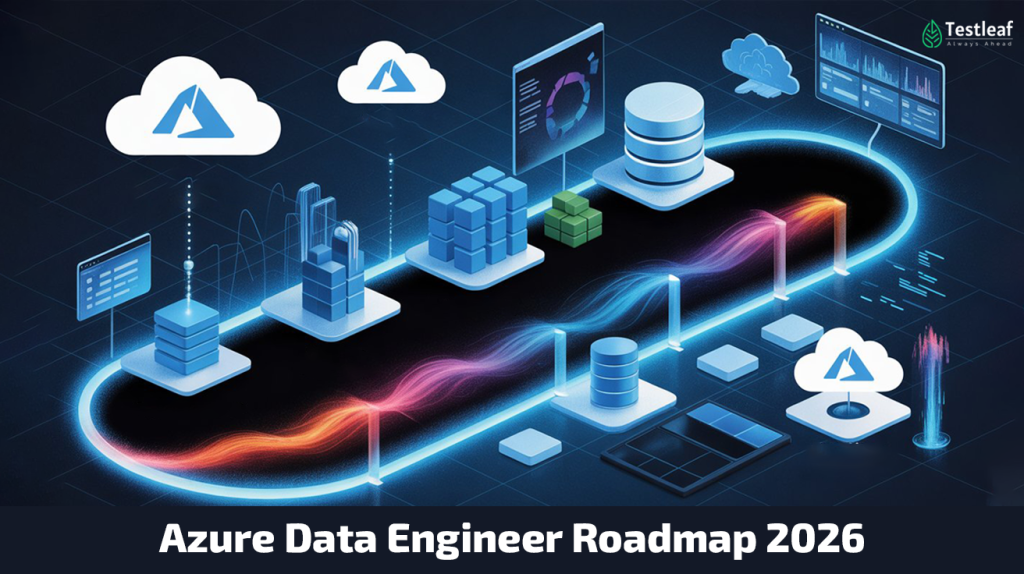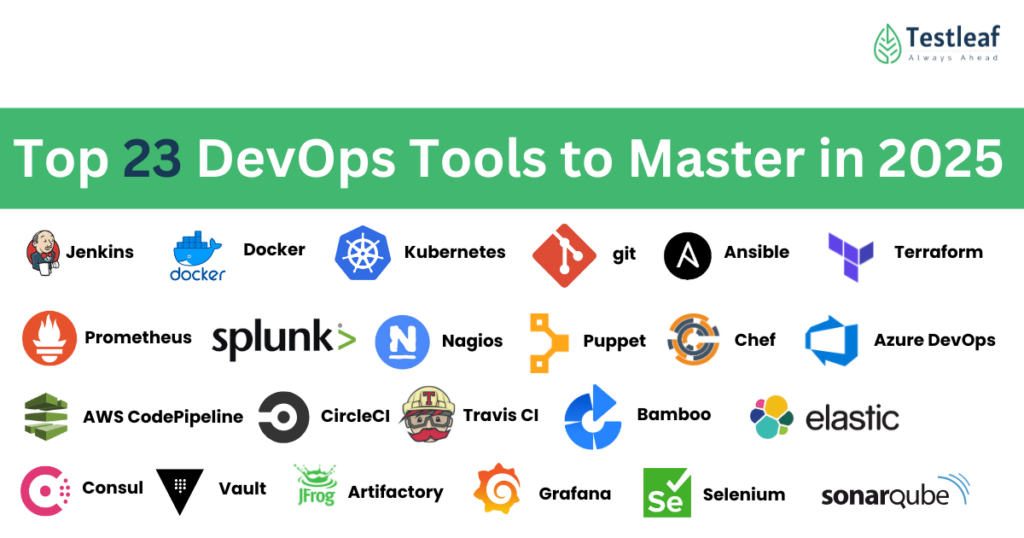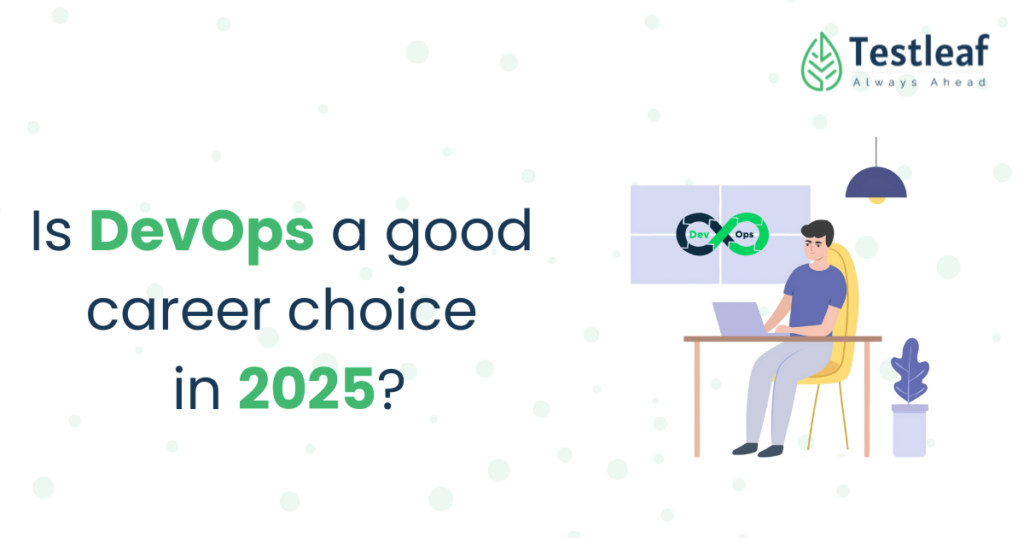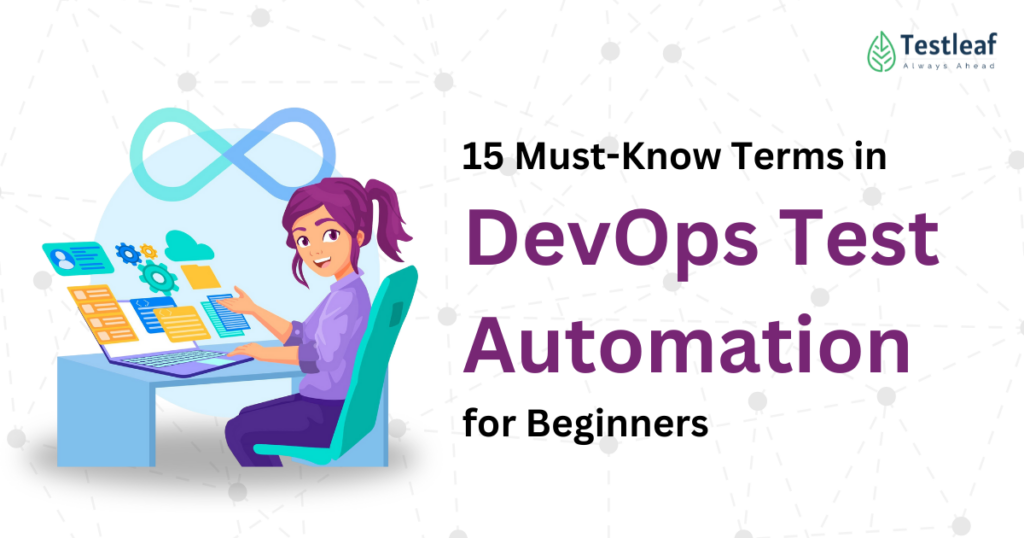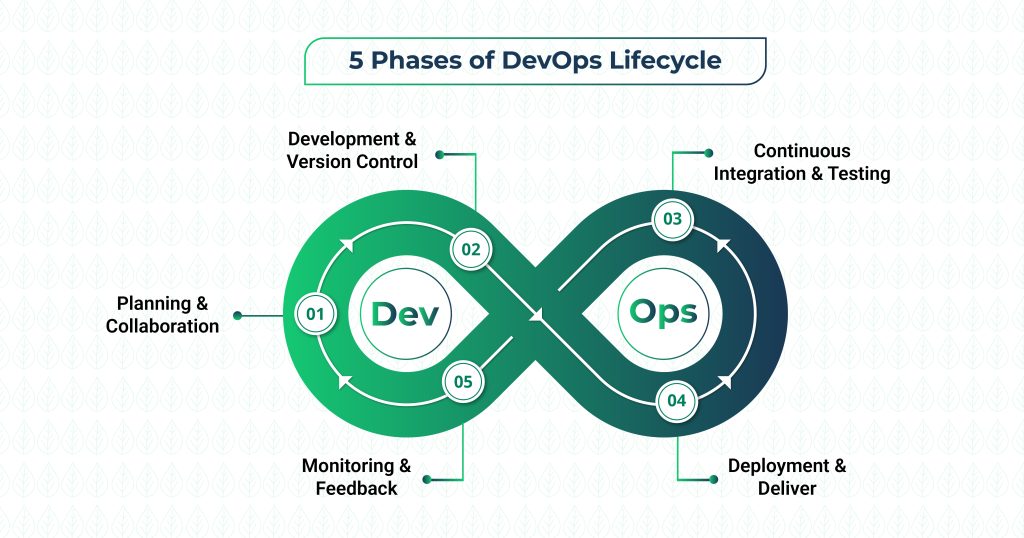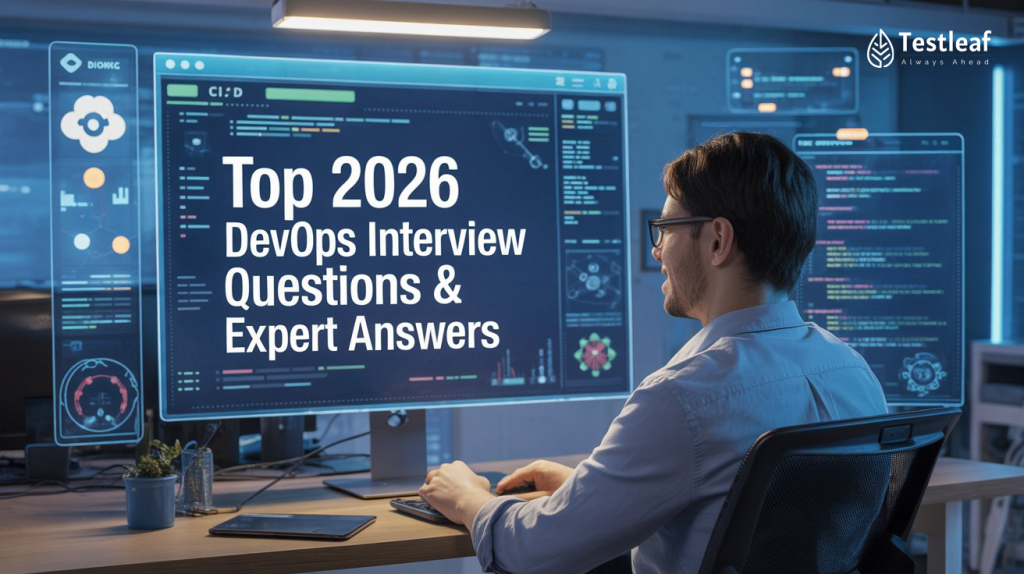Becoming an Azure Data Engineer in 2026 is one of the smartest career moves in tech. With every company shifting toward cloud analytics, real-time dashboards, AI workloads, and secure data pipelines, demand for Azure Data Engineers has never been higher.
But the real question is: What exactly should you learn in 2026 to become a job-ready Azure Data Engineer?
And how does Azure DevOps fit into this path?
This roadmap gives you a crystal-clear learning path, explains how data engineering has changed, and shows why DevOps knowledge now gives candidates a massive competitive edge.
Why Azure Data Engineering Is Booming in 2026
Azure has become the cloud of choice for enterprises, thanks to its strong integration between storage, analytics, security, and AI workloads. Organizations need professionals who can:
- Move data from multiple sources into Azure
- Build scalable pipelines
- Ensure high data quality
- Create analytics-ready datasets for BI, ML, and AI systems
This makes Azure Data Engineering a powerful, future-proof career path.
More Insights: selenium interview questions
Azure Data Engineer Roadmap for 2026
1. Master the Core Fundamentals (First 30 Days)
Before touching any cloud tool, you need to build a strong foundation in:
- SQL (joins, CTEs, window functions, performance tuning)
- Python (Pandas, data cleaning, REST API handling)
- Data modeling (star schema, SCD, normalization)
- ETL vs ELT concepts
These fundamentals remain the backbone of every data engineering project.
2. Learn Modern Azure Storage Services (Month 2)
Azure Data Engineers must know where and how data is stored:
- Azure Data Lake Storage Gen2 – the main storage layer for raw and curated data
- Azure Blob Storage – object storage for files, logs, images
- Azure SQL Database / Managed Instance
- Azure Synapse Analytics Dedicated SQL Pools
This is your base layer for enterprise-grade data pipelines.
Continue Reading: playwright interview questions
3. Build Data Pipelines With Azure Data Factory & Synapse Pipelines (Month 3)
Data Factory is the engine that moves and transforms data.
You should learn:
- Linked services
- Self-hosted integration runtime
- Copy activity
- Data flows
- Pipeline orchestration
- Triggers and scheduling
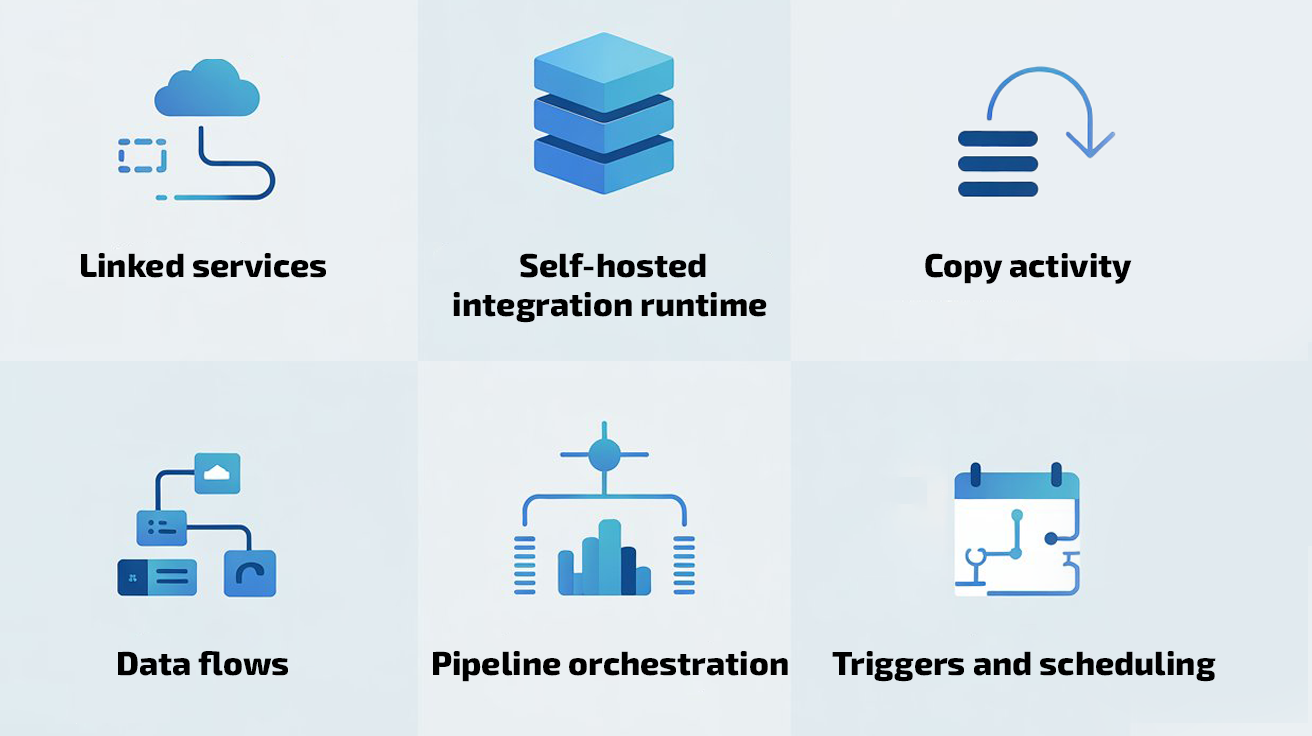
In 2026, hybrid pipelines (on-prem + cloud) are the most in demand.
4. Learn Apache Spark on Azure (Month 4)
Azure Data Engineers must know Spark, especially using:
- Azure Databricks
- Azure Synapse Spark Pools
Focus on:
- Spark SQL
- Delta Lake
- Medallion architecture (Bronze → Silver → Gold)
- Optimized tables & partitioning
Spark is the single most important skill to handle big data.
5. Master Azure Analytics & Real-Time Processing (Month 5)
Data Engineers now support analytics teams, ML engineers, and BI developers.
Learn how to integrate:
- Azure Synapse Analytics (Lakehouse + SQL + Spark)
- Power BI (datasets, semantic models)
- Azure Stream Analytics for real-time data
- Event Hubs & IoT Hub for streaming pipelines
This is where you become a true end-to-end data engineer.
Further Reading: automation testing interview questions
6. Understand Azure Security & Governance (Month 6)
No company hires data engineers who ignore governance.
Learn:
- Key Vault integration
- Data encryption & managed identities
- Purview for data cataloging, lineage & compliance
Security and governance are core priorities for every enterprise.
7. Why DevOps Skills Matter in the Data Engineer Journey (2026 Update)
Today’s data platforms are no longer manual. They run on automated CI/CD pipelines, version-controlled notebooks, reusable parametrized templates, and infrastructure-as-code.
This is where DevOps knowledge becomes an accelerator.
Knowing how to use pipelines, repos, YAML automation, and release workflows helps you:
- Deploy Data Factory pipelines automatically
- Version-control Databricks notebooks
- Automate Spark jobs
- Manage reusable infrastructure templates (ARM/Bicep/Terraform)
- Reduce manual deployment errors
Many hiring managers now look for candidates who have completed an Azure DevOps Certification because it proves you can build scalable, automated, and resilient data platforms.
If you’re starting from scratch, taking training on DevOps alongside your data engineering roadmap can dramatically improve your job readiness.
Final 2026 Azure Data Engineer Skills Checklist
By the end of this roadmap, you should be confident in:
✔ SQL + Python
✔ Azure Storage Technologies
✔ Azure Data Factory
✔ Synapse Analytics
✔ Azure Databricks + Spark
✔ Delta Lake + Lakehouse Concepts
✔ Streaming Pipelines
✔ Azure Security + Governance
✔ DevOps CI/CD for Data Platforms
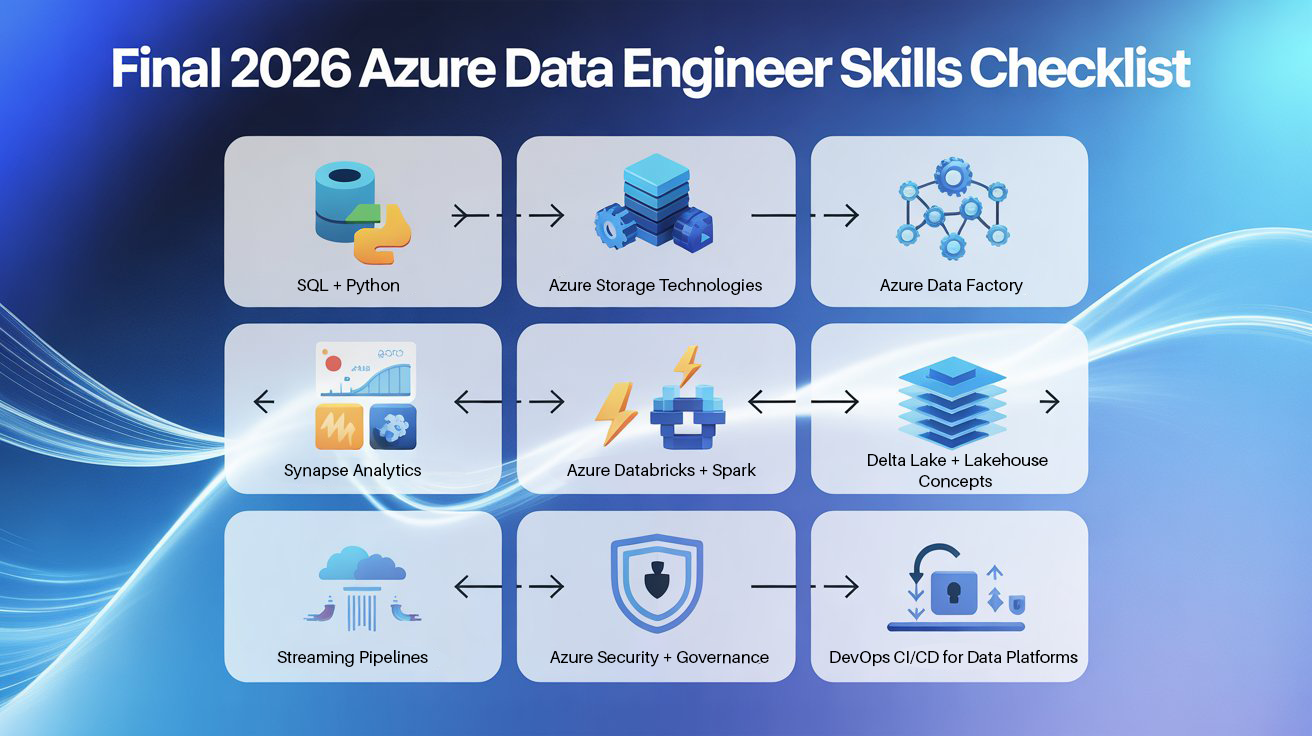
Mastering these ensures you stand out from 90% of candidates in 2026.
You Might Also Like: epam interview questions
Conclusion
The role of an Azure Data Engineer is evolving fast, and companies now expect engineers who can design data pipelines, automate cloud deployments, enforce governance, and support analytics teams.
By following this 2026 roadmap—and strengthening your DevOps foundation—you position yourself as a modern, high-value Azure Data Engineer ready for enterprise-level projects. Your journey begins with consistent practice, hands-on cloud labs, and the willingness to stay updated in the ever-growing Azure ecosystem.
FAQs
1. What skills do I need to become an Azure Data Engineer in 2026?
You need strong fundamentals in SQL, Python, Azure storage technologies, Azure Data Factory, Databricks, Synapse Analytics, security, governance, and DevOps-driven CI/CD.
2. How important is DevOps in the Azure Data Engineer journey?
DevOps is now essential. Azure Data Engineers must automate deployments, manage version control, and build CI/CD pipelines for scalable cloud data platforms.
3. Which Azure services should data engineers learn first?
Start with Azure Data Lake Storage, Blob Storage, Azure SQL, and Synapse Analytics. These form the foundation of cloud-based data architecture.
4. Do I need Spark to become an Azure Data Engineer?
Yes. Apache Spark on Databricks or Synapse Spark Pools is a critical skill for processing large datasets, building medallion architectures, and optimizing pipelines.
5. How long does it take to become an Azure Data Engineer?
On average, 5–6 months of focused learning—covering fundamentals, storage, pipelines, Spark, analytics, and DevOps—is enough to become job-ready.
6. Can beginners transition into Azure Data Engineering in 2026?
Absolutely. With structured learning, cloud labs, and DevOps exposure, beginners can transition into Azure data roles faster than ever.
We Also Provide Training In:
- Advanced Selenium Training
- Playwright Training
- Gen AI Training
- AWS Training
- REST API Training
- Full Stack Training
- Appium Training
- DevOps Training
- JMeter Performance Training
Author’s Bio:

Content Writer at Testleaf, specializing in SEO-driven content for test automation, software development, and cybersecurity. I turn complex technical topics into clear, engaging stories that educate, inspire, and drive digital transformation.
Ezhirkadhir Raja
Content Writer – Testleaf
